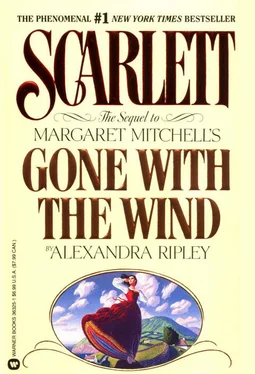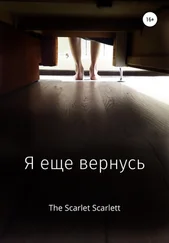Alexandra Ripley - Scarlett
Здесь есть возможность читать онлайн «Alexandra Ripley - Scarlett» весь текст электронной книги совершенно бесплатно (целиком полную версию без сокращений). В некоторых случаях можно слушать аудио, скачать через торрент в формате fb2 и присутствует краткое содержание. Город: New York, ISBN: , Издательство: Grand Central Publishing, Жанр: Исторические любовные романы, на английском языке. Описание произведения, (предисловие) а так же отзывы посетителей доступны на портале библиотеки ЛибКат.
- Название:Scarlett
- Автор:
- Издательство:Grand Central Publishing
- Жанр:
- Год:неизвестен
- Город:New York
- ISBN:0-446-51507-8
- Рейтинг книги:5 / 5. Голосов: 1
-
Избранное:Добавить в избранное
- Отзывы:
-
Ваша оценка:
- 100
- 1
- 2
- 3
- 4
- 5
Scarlett: краткое содержание, описание и аннотация
Предлагаем к чтению аннотацию, описание, краткое содержание или предисловие (зависит от того, что написал сам автор книги «Scarlett»). Если вы не нашли необходимую информацию о книге — напишите в комментариях, мы постараемся отыскать её.
Scarlett — читать онлайн бесплатно полную книгу (весь текст) целиком
Ниже представлен текст книги, разбитый по страницам. Система сохранения места последней прочитанной страницы, позволяет с удобством читать онлайн бесплатно книгу «Scarlett», без необходимости каждый раз заново искать на чём Вы остановились. Поставьте закладку, и сможете в любой момент перейти на страницу, на которой закончили чтение.
Интервал:
Закладка:
She stared ahead, facing all her demons. Melanie’s death . . . Mammy’s death . . . Rhett’s leaving her, saying that their marriage was dead.
That was the worst. Rhett going away. That was what she had to meet head-on. She heard his voice: “Nothing’s changed.”
It couldn’t be true! But it was.
She had to find a way to get him back. She’d always been able to get any man she wanted, and Rhett was a man like any other man, wasn’t he?
No, he wasn’t like any other man, and that’s why she wanted him. She shivered, suddenly afraid. Suppose that this time she didn’t win? She had always won, one way or another. She’d always gotten what she wanted, somehow. Until now.
Above her head a bluejay cried raucously. Scarlett looked up, heard a second jeering cry. “Leave me alone,” she shouted. The bird flew away, a whirr of gaudy blue.
She had to think, to remember what Rhett had said. Not this morning or last night or whenever it was that Mammy died. What did he say at our house, the night he left Atlanta? He talked on and on, explaining things. He was so calm, so horribly patient, the way you can be with people you don’t care enough about to get mad at them.
Her mind seized on an almost-forgotten sentence, and she forgot her exhaustion. She had found what she needed. Yes, yes, she remembered it clearly. Rhett had offered her a divorce. Then, after her furious rejection of the offer, he had said it. Scarlett closed her eyes, hearing his voice in her head. “I’ll come back often enough to keep gossip down.” She smiled. She hadn’t won yet, but there was a chance. A chance was enough to go on with. She stood up and picked the pine needles off her frock, out of her hair. She must look a mess.
The muddy yellow Flint River ran slowly and deeply below the ledge that held the pine woods. Scarlett looked down and threw in the handful of pine needles. They swirled away in the current. “Moving on,” she murmured. “Just like me. Don’t look back, what’s done is done. Move on.” She squinted up at the bright sky. A line of brilliant white clouds was rushing across it. They looked full of wind. It’s going to get colder, she thought automatically. I’d better find something warm to wear this afternoon at the burial. She turned toward home. The sloping pasture looked steeper than she remembered. No matter. She had to get back to the house and tidy herself. She owed it to Mammy to look neat. Mammy had always fussed when she looked messy.
3
Scarlett swayed on her feet. She must have been as tired as this sometime before in her life, but she couldn’t remember. She was too tired to remember.
I’m tired of funerals, I’m tired of death, I’m tired of my life falling away, a piece at a time, and leaving me all alone.
The graveyard at Tara was not very large. Mammy’s grave looked big, ever so much bigger than Melly’s, Scarlett thought disjointedly, but Mammy had shrivelled up so that she probably wasn’t any bigger at all. She didn’t need such a big grave.
The wind had a bite in it, for all that the sky was so blue and the sun so bright. Yellowed leaves skittered across the burial ground, blown by the wind. Autumn’s coming, if it’s not here already, she thought. I used to love the fall in the country, riding through the woods. The ground looked like it had gold on it, and the air tasted like cider. So long ago. There hasn’t been a proper riding horse at Tara since Pa died.
She looked at the gravestones. Gerald O’Hara, born County Meath, Ireland. Ellen Robillard O’Hara, born Savannah, Georgia. Gerald O’Hara, Jr.—three tiny stones, all alike. The brothers she’d never known. At least Mammy was being buried here, next to “Miss Ellen,” her first love, and not in the slaves’ burial plot. Suellen screamed to high heaven, but I won that fight, soon as Will came in on my side. When Will puts his foot down, it stays put. Too bad he’s so stiff-necked about letting me give him some money. The house looks terrible.
So does the graveyard, for that matter. Weeds all over the place, it’s downright shabby. This whole funeral is downright shabby, Mammy would have hated it. That black preacher is going on and on, and he didn’t even know her, I’ll bet. Mammy wouldn’t give the time of day to the likes of him, she was a Roman Catholic, everybody in the Robillard house was, except Grandfather, and he didn’t have much say about anything, to hear Mammy tell it. We should have gotten a priest, but the closest one is in Atlanta, it would have taken days. Poor Mammy. Poor Mother, too. She died and was buried without a priest. Pa, too, but likely it didn’t matter so much to him. He used to doze through the Devotions Mother led every night.
Scarlett looked at the unkempt graveyard, then over at the shabby front of the house. I’m glad Mother isn’t here to see this, she thought with sudden fierce anger and pain. It would break her heart. Scarlett could—for a moment—see the tall, graceful form of her mother as clearly as if Ellen O’Hara were there among the mourners at the burial. Always impeccably groomed, her white hands busy with needlework or gloved to go out on one of her errands of mercy, always soft-voiced, always occupied with the perpetual work required to produce the orderly perfection that was life at Tara under her guidance. How did she do it? Scarlett cried silently. How did she make the world so wonderful as long as she was there? We were all so happy then. No matter what happened, Mother could make it all right. How I wish she was still here! She’d hold me close to her, and all the troubles would go away.
No, no, I don’t want her to be here. It would make her so sad to see what’s happened to Tara, what’s happened to me. She’d be disappointed in me, and I couldn’t bear that. Anything but that. I won’t think about it, I mustn’t. I’ll think about something else—I wonder if Delilah had sense enough to fix something to feed people after the burial. Suellen wouldn’t think of it, and she’s too mean to spend money on a collation anyhow.
Not that it would set her back all that much—there’s hardly anybody here. That black preacher looks like he could eat enough for twenty, though. If he doesn’t stop going on about resting in Abraham’s bosom and crossing the River Jordan, I’m going to scream. Those three scrawny women he calls a choir are the only people here who don’t look twitchy from embarrassment. Some choir! Tambourines and spirituals! Mammy should have something solemn in Latin, not “Climbing Jacob’s Ladder.” Oh, it’s all so tacky. A good thing there’s almost nobody here, just Suellen and Will and me and the children and the servants. At least we all really loved Mammy and care that she’s gone. Big Sam’s eyes are red from crying. Look at poor old Pork, crying his eyes out, too. Why, his share’s almost white; I never think of him as old. Dilcey sure doesn’t look her age, whatever that might be, she hasn’t changed a bit since she first came to Tara . . .
Scarlett’s exhausted, rambling mind suddenly sharpened. What were Pork and Dilcey doing here at all? They hadn’t worked at Tara for years. Not since Pork became Rhett’s valet and Dilcey, Pork’s wife, went to Melanie’s house, as Beau’s mammy. How did they come to be here, at Tara? There was no way they could have learned about Mammy’s death. Unless Rhett told them.
Scarlett looked over her shoulder. Had Rhett come back? There was no sign of him. As soon as the service was over, she made a beeline for Pork. Let Will and Suellen deal with the long-winded preacher.
“It’s a sad day, Miss Scarlett,” Pork’s eyes were still welling with tears.
“Yes, it is, Pork,” she said. Mustn’t rush him, she knew, or she’d never find out what she wanted to know.
Читать дальшеИнтервал:
Закладка:
Похожие книги на «Scarlett»
Представляем Вашему вниманию похожие книги на «Scarlett» списком для выбора. Мы отобрали схожую по названию и смыслу литературу в надежде предоставить читателям больше вариантов отыскать новые, интересные, ещё непрочитанные произведения.
Обсуждение, отзывы о книге «Scarlett» и просто собственные мнения читателей. Оставьте ваши комментарии, напишите, что Вы думаете о произведении, его смысле или главных героях. Укажите что конкретно понравилось, а что нет, и почему Вы так считаете.












